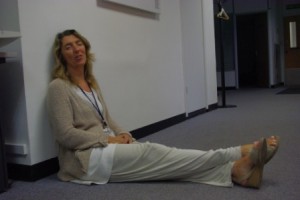[or: What’s an Unconference?]
 No plenary speakers. No opening speech. No PowerPoint lectures. No panel discussions. No publisher exhibition. Sound like a conference?
No plenary speakers. No opening speech. No PowerPoint lectures. No panel discussions. No publisher exhibition. Sound like a conference?
Hopefully not- it’s an Unconference!
An unconference is a f2f event which is participant driven, and I had my first taste of one as a facilitator in Moscow last week. And what an experience it was! Rebooting the Conference was sponsored by the British Council Moscow, and focused on learning technologies and English language teaching. Highlights of the unconference included:
- an initial Pecha Kucha style presentation by pairs of facilitators describing to participants what their sessions would consist of
- an Unparty in which participants brought along their own music and/or musical instruments
- daily 3 hour sessions, with a topic set by facilitators, during which themes and areas for discussion and exploration were raised by the participants themselves
- participants produced summaries/posters/PowerPoints of things they thought worth highlighting from each session
- a team of 3 text bloggers and 1 video blogger captured the event in real time
- open slots of 20 minutes each on day 2 enabled unconference participants to run a session on any topic they fancied. An excellent range of short sessions was run by participants on topics from IWBs to social bookmarking
- a live videoconferencing event co-ordinated by the IATEFL Learning Technologies Special Interest Group, with contributors from 5 different countries, beamed into the unconference venue. Watch the recording.
- an undebate about copyright in a groovy bar, with participants discussing issues over beers and then sharing their opinions with everyone
- a final round up activity in which participants shared their impressions and learning points from the unconference
Feedback from participants confirmed that the Unconference format, although new to almost everybody there (including the facilitators!), can be a very stimulating one. Participants cited the chance to bring out their own experiences, and share these, as deeply rewarding. They appreciated the chance to contribute as equals alongside supposed experts on the topics – the Unconference format operates on the premise that there are no experts, and that everybody has something of value to contribute.
So, if you’re thinking about setting up an Unconference, you could do worse
than use some of the ideas and format above! Best of all, there are plenty of digital assets you can check out from our unconference – the best place to start are the conference bloggers’ pages:
- Olga Dolganova
- Anton Arhipov
- Olga Belyaeva
- Larisa Strukhova (video blog)
Many of the blog posts have resources, PowerPoints, and posters produced by participants. Enjoy!
A huge thank you to Olga Barnashova and the British Council team for superb organization; to my colleague Gavin Dudeney for his great work on the Unconference session ideas; to my co-facilitators for being such a pleasure to work with; to the bloggers for their excellent reporting; and to Moscow for the great food and vodka.
Nicky Hockly
The Consultants-E
September 2010


Hi Nicky
It sounds as if you had a great time! I certainly enjoyed all that I managed to catch up with from over here. The ELT world is just so good at sharing! Thanks to all of you.
Carol
Hi Carol, Great to hear you managed to follow the conference from a distance. Although we couldn’t live stream the events via video (and in any case, there was a lot of process going on, not that watchable!), the bloggers did a great job of sharing the flavour of the sessions, I think..
Hi Nicky,
The Unconference you described above sound just like ideal teaching would be like. Wow!
Wish I’d been there.
You look great and exhausted in the photo :-). You and the rest of the team must have done a lot of work.
Why not come along to Budapest to do a similar Unconference? I’ll try to look into its organisation and will get back to you. If you have any tips on this, I’d be grateful.
Thanks,
Erika
Hi Erika, It was indeed exhausting, but it must be said that the British Council organising team did a thousand times more than we facilitators did. Funny how an unplanned event seems to take such careful planning… 🙂
Would love to do a similar event in Budapest, perhaps approaching your local British Council, or a teachers association such as IATEFL Hungary (www.iatefl.hu) would be a good place to start. Let me know if I can be of any help!
This all looks like great fun, and added to that it seems like an opportunity to learn a lot. Equally the social and dynamic aspect appeals to me.
But… (after such a start there has to be a “but”)
When I look at innovation I always ask myself what benefit the new idea brings over the what we already have and with unconferences I feel there are more than a few open issues.
Is this just being different because we can be different? At a traditional conference I know the programme in advance and can plan my personal development alongside networking and other activities. I can’t guarantee that the experience will be good, but I have more to go on than a list of headline names.
The description here focuses mostly on the infrastructure and it certainly is impressive, but ultimately a(n) (un)conference stands or falls on its content. The idea of spontaneous presentations sounds good on the face of it, but wouldn’t a virtual discussion phase before the conference give the opportunity for better-prepared presentations?
Please don’t get me wrong – I’m not dismissing the idea out of hand. But what is the benefit of an unconference? Is it just the different atmosphere? Or is there a real learning advantage for the participants? Is the unconference a replacement for the traditional conference, is it a development of the traditional conference, or is it a marketing gag?
I hope these questions don’t come across as being aggressive – it’s just that reports of such events always seem to stress the features rather than the benefits.
Hi Olaf, Thanks very much for these comments – well-put critical engagement is always welcome 🙂
The aim of this blog post (as you point out) is to provide a general description of the types of activities/events that might appear in an unconference for those who might be unfamiliar with the format (like me). I have to admit I also had my doubts about the format, being the kind of person who likes to be ‘well-prepared’. As a facilitator at an unconference, it’s a very interesting thing to let go and move out of one’s comfort zone.
For example with my co-facilitator Neil Ballantyne, we tried out a fishbowl discussion in one of our sessions (see here for a description of how this works: http://en.wikipedia.org/wiki/Fishbowl_%28conversation%29 This is a technique I’d never tried before with a large group, and I was impressed and pleasantly surprised with how quickly participants took up the discussion and had lots of very interesting things to contribute on our topic (mobile learning).
You ask what the benefit of an unconference format is. After experiencing one, I’d say there are several: it draws on everyone’s expertise and experience, it focuses on process and development rather than discrete input and content, and it allows participants to set the agenda. This means that their concerns are more likely to be addressed. Certainly we weren’t sure how any of this would go over with the participants, and the feedback was a lot more positive than we had expected (90% delighted, 10% not completely convinced).
Having said all that, I don’t think it’s a case of either/or (conference or unconference), or that one format is better than another. They are different, and they serve different purposes and needs. In fact, within a traditional conference structure, there is definitely space for these more unstructured open space events.
Hope this helps clarify things a bit? And thanks for your questions!
Dear Olaf,
could I interfere and try to answer some of your questions from a position of an ‘insider’? I was one of the facilitators of the unconference and I am Russian, which is important in this case.
Of course, a virtual discussion phase would be incredibly helpful (just as when all your students do your homework on time), but I had a person in my session who found it hard to type. Unfortunately, we have to face to fact that quite a lot of teachers in Russia are still ICT-illiterate, so we had to rely on what they came up with on the spot. But I’m positive – some time, some day 🙂
As for exactly this type of even was, this is by no means a replacement of a traditional format. Partially, this was a friendly get-together before a tiring school year (in Russia all schools, nurseries and universities start their academic year on September 1). To fully appreciate the sense of the unconference in Russia, not in any other country, one has to realize that usual teacher-training events are rather boring and very official. I can hardly imagine talking to any of traditional teacher-trainers sitting at the same table in a cafe during the debate 🙂 Usually, you just sit and listen (maybe, write if you are diligent enough, or sleep as I did a few days ago). You can hardly ever speak up. The Soviet legacy is still strong…
So, for us, events like these are something quite shocking, but thought-provoking. They demonstrate that education can be fun!
Hi Vera, Hi Nicky
Thanks for providing me with more food for thought on this. I can see the cultural aspect could well be an advantage in Russia and I can see that the inclusive nature would be strengthened by such a format. I can’t honestly say I’m totally convinced, but I’ll definitely try to attend such an event as soon as possible to see for myself!
One thing I can’t help but notice, having now read several articles on these events – sticking un- in front of every aspect of the event evokes feelings in me similar to McMuffins, McToast and McNuggets. ;o)
Thanks for your help in getting me to understand this thing better and I hope to see you at one of these events sometime in the future.
Olaf